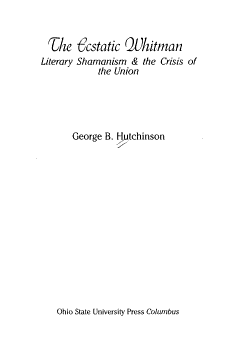- Published on
The Ecstatic Whitman
- Authors

- Name
- George Hutchinson
- @search?q=George Hutchinson

THE ECSTATIC WHITMAN: THE BODY AND SUFISTIC INFLUENCES IN LEAVES OF GRASS
Summary
This thesis by Ryan Frabizio explores the profound influence of Sufistic philosophy on Walt Whitman's seminal work, Leaves of Grass. It delves into how Sufi themes of ecstasy, unity with the divine, and a deep reverence for the body as a vessel of the soul are mirrored in Whitman's poetry. The study argues that Whitman’s portrayal of the body and the soul, and his vision of a transcendental unity among all beings, draw significantly from Sufistic ideas, presenting a compelling case for re-evaluating the spiritual underpinnings of Whitman's work.
Key Points
Sufistic Influence: The thesis outlines historical and philosophical connections between Whitman's ideas and Sufism, noting similarities in their views on the unity of existence, the sanctity of the individual soul, and the pursuit of ecstatic spiritual experiences.
The Body as a Sacred Vessel: Frabizio examines how Whitman elevates the physical form to a sacred status, a concept that resonates with Sufi appreciation for the human body as a divine creation and a means to spiritual enlightenment.
Ecstatic Experiences: The analysis highlights how Whitman’s poetry encapsulates the ecstatic joy found in Sufi mysticism, with an emphasis on moments of transcendental realization and unity with the cosmos.
Transcendental Unity: The work underscores Whitman's vision of a universal brotherhood, reflecting Sufistic ideals of transcending ego and societal divisions to achieve a harmonious oneness with all creation.
Conclusion
Ryan Frabizio's thesis presents a compelling argument that Sufistic philosophy profoundly influenced Walt Whitman's Leaves of Grass, particularly in its treatment of the body and the soul, and its quest for ecstatic, transcendental experiences. By drawing parallels between Sufism and Whitman's work, the thesis enriches our understanding of the poet's spiritual vision and offers a new lens through which to appreciate his celebration of the body and the interconnectedness of all life.
Implications
This analysis not only deepens the appreciation for Whitman's poetry but also contributes to the broader discourse on the intersection of literature and spirituality, highlighting the universality of mystic experiences across cultures and eras.
